| Submit | All submissions | Best solutions | Back to list |
STPAR - Street Parade |
For sure, the love mobiles will roll again on this summer's street parade. Each year, the organisers decide on a fixed order for the decorated trucks. Experience taught them to keep free a side street to be able to bring the trucks into order.
The side street is so narrow that no two cars can pass each other. Thus, the love mobile that enters the side street last must necessarily leave the side street first. Because the trucks and the ravers move up closely, a truck cannot drive back and re-enter the side street or the approach street.
You are given the order in which the love mobiles arrive. Write a program that decides if the love mobiles can be brought into the order that the organisers want them to be.
Input
There are several test cases. The first line of each test case contains a single number n, the number of love mobiles. The second line contains the numbers 1 to n in an arbitrary order. All the numbers are separated by single spaces. These numbers indicate the order in which the trucks arrive in the approach street. No more than 1000 love mobiles participate in the street parade. Input ends with number 0.
Output
For each test case your program has to output a line containing a single word "yes" if the love mobiles can be re-ordered with the help of the side street, and a single word "no" in the opposite case.
Example
Sample input: 5 5 1 2 4 3 0 Sample output: yes
Illustration
The sample input reflects the following situation:
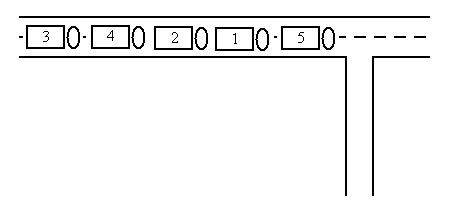
The five trucks can be re-ordered in the following way:
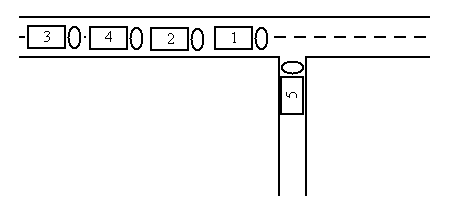
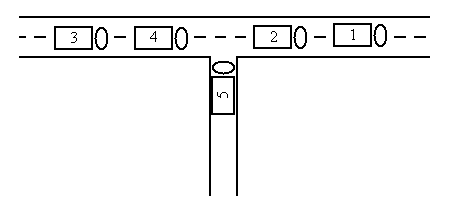
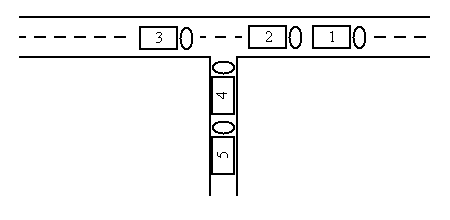
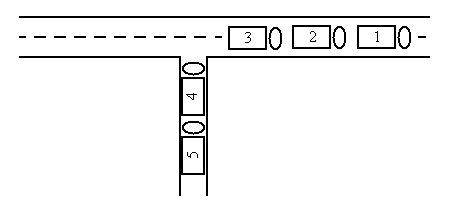
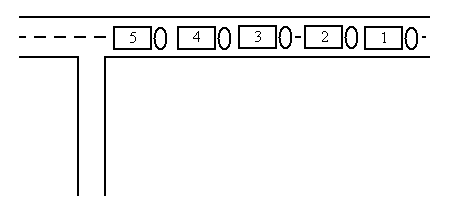
| Added by: | Patryk Pomykalski |
| Date: | 2004-07-01 |
| Time limit: | 1s-2s |
| Source limit: | 50000B |
| Memory limit: | 1536MB |
| Cluster: | Cube (Intel G860) |
| Languages: | All except: NODEJS PERL6 VB.NET |
| Resource: | Swiss Olympiad in Informatics 2004 |
hide comments
|
||||||||||||||
|
2018-06-25 18:35:14
As pointed out by randomuser22: 2017-09-02 05:10:43 0 is the last input after all of the inputs, not the last input after each. ex) 5 5 4 3 1 2 5 5 4 3 1 2 5 5 4 3 1 2 0 Not: 5 5 4 3 1 2 0 5 5 4 3 1 2 0 |
||||||||||||||
|
2018-06-17 16:06:17
AC in 1 go! Thanks for the test cases in the comments :) Last edit: 2018-06-17 16:06:32 |
||||||||||||||
|
2018-06-17 09:37:01
I have 2 doubts.. 1.can there be a decreasing order also..?? 2.Will they always start from 1......? |
||||||||||||||
|
2018-06-14 21:56:17
AC in one go ... thanks for the test cases |
||||||||||||||
|
2018-06-11 21:01:50
Thanks @pkdhirasaria. Try the test cases one by one. NOTE : The side street can accommodate any number of trucks. |
||||||||||||||
|
2018-06-11 20:14:00
Easy Problem.... Just remember the 0 at the end plays very important role, it is not for fun. @randomuser22 Thanks for you help |
||||||||||||||
|
2018-06-09 23:39:03
AC in 1 go!! |
||||||||||||||
|
2018-06-09 07:52:28
The test cases in the comments helped out a lot. If your solution passes them, then you can be assured of AC in 1 go !! |
||||||||||||||
|
2018-06-06 20:58:54
AC in 1 go! @trupti18 you are wrong. The input contains numbers 1 to n in arbitrary order with no repetitions. |
||||||||||||||
|
2018-06-01 15:56:44
Just changed one if to while with same conditions and code got accepted |
||||||||||||||


 RSS
RSS